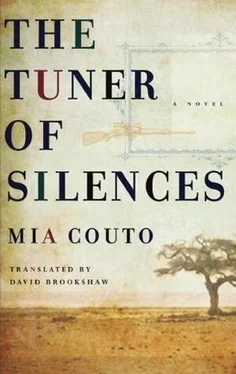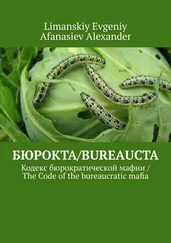— Ntunzi, aren’t you going to take your case?
— I’m only taking the map. The rest, I’ll leave here.
Ntunzi went out. I couldn’t resist glancing into his case. It was empty except for a cloth folder tied with string. I undid the strings and dozens of papers fell out. In each one, Ntunzi had drawn women’s faces. There were dozens of faces, all of them different. In the corner of each piece of paper, he had written: “Portrait of my mother, Dordalma.” I gathered the drawings together and put them back in the case. Then, I dashed out without even taking a last look around the room. When we are children, we never take our leave of places. We always think we’ll be back. We never believe it’s the last time.

I was the first to climb into the truck. Ntunzi sat next to me, at the back. Zachary appeared as we had never seen him before. For the first time, he was in civilian clothes. He was weighed down by a rucksack on his back.
— Is that all you’re taking, Zachary?
— I’ll be back later. We’re in a hurry now.
Aproximado and Zachary went to fetch my old father. I still thought he might dig in his heels and refuse to come. But no. Silvestre came, walking like a child and as obediently as a servant. He installed himself in the front passenger seat, and made room for the Portuguese woman to sit beside him.
The truck lurched forward with a whine and then advanced slowly, passing the entrance gate and leaving in its wake a cloud of dust and fumes.
Seated on top of the baggage, Ntunzi was exultant, and he held my shoulders with both hands:
— We’re going to the city, little brother. I can’t believe it. .
I turned my face away: before long my brother would be shedding tears of joy and at that moment all that I wanted were my impure feelings, in which happiness was mixed with nostalgia. I waved farewell, without realizing that there was no one on the other side. The only creature left in Jezoosalem was neither human nor alive: Jezebel, may God rest her soul.
— Who are you saying goodbye to?
I didn’t answer. It wasn’t Jezebel I was taking my leave of. I was saying farewell to myself. My childhood had been left on the other side. By setting out on this journey, I had ceased being a child. Mwanito had stayed behind in Jezoosalem, and I needed a new name, a new baptism.
That was when the vision struck me: without any other wind apart from the breeze produced by our old truck, the trees around us began to detach themselves from the ground and to flutter like ungainly green herons.
— Look, brother! They’re herons. .
Neither Ntunzi nor Zachary heard me. Then, it occurred to me that I should take a photo of these flying pieces of vegetation. Mine was a strange appetite: for the first time, it wasn’t enough for me to see the world. Now, I wanted to see the way I looked at the world.
I got up and leaned on the roof of the passenger cabin to ask Marta for her camera. Standing there, I faced the road as if it were cutting me in half as it passed under the vehicle, separating joy from sadness.
When I managed to get a glimpse of the front seat, I got a surprise: my father and the Portuguese woman were hand in hand. The two of them were sharing a silent conversation about their respective nostalgias. I didn’t have the courage to interrupt their silent dialogue. So I sat down again, a piece of baggage among all the other baggage, a relic among other dust-covered relics.
Two days passed with brief pauses and the continual roar of the vehicle’s engine. At the end of the second day of the journey, as I slept with the swaying of the truck, I was no longer aware of the road. I was awoken with a start by Ntunzi’s nudges. For the first time, we were going through a town. That was when I stared in wonder at streets crowded with people. Everything was exhilarating. The urban bustle, the cars, the advertisements, the street hawkers, the bicycles, kids like me. And the women: in pairs, in groups, in throngs. Full of clothes, full of colours, full of laughter. Wrapped in capulanas, concealing their mysteries. My mother, Dordalma: I saw her in every woman’s body, every face, every burst of laughter.
— Look at the people, Father.
— What people? I can’t see anyone.
— Can’t you see the houses, the cars, the people?
— Absolutely nothing. Didn’t I tell you it was all dead, all empty?
He was feigning blindness. Or had he really been blinded as a result of the snake bite? While Silvestre sat hunched in his seat, Marta held her cellphone out of the window, turning it this way and that.
— What are you doing, Miss Marta? — Zachary asked.
— I’m seeing if I can pick up a network signal —she replied.
She was obliged to bring her arm in. But for the remainder of the journey, Marta’s arm swivelled this way and that like a rotating antenna. It was longing that guided her hand, seeking a signal from Portugal, a voice to comfort her, a word that would steal her back from geography.
— So when do we arrive, Zaca?
— We already arrived some time ago.
— We’ve arrived in the city?
— This is the city.
We had arrived without noticing where the rural world had ended. There was no clear border. Merely a transition in intensity, a chaos that got more dense: nothing more than that. In the passenger cabin, my father intoned, with a morbid shake of his head:
— Everything’s dead, everything’s dead.
There are those who die and are buried. That was the case with Jezebel. But cities die and decay before our noses, their entrails exposed, infecting us within. Cities decay within us. That’s what Silvestre Vitalício said.

At the entrance to the hospital, our old father refused to get out of the truck.
— Why do you want to kill me?
— What are you talking about, brother?
— It’s a cemetery, I know perfectly well what it is.
— No, Father. It’s a hospital.
The family’s efforts to get him out of the vehicle were all in vain. Aproximado sat down on the sidewalk, his head in his hands. It was Zachary who thought of a way to get us out of the impasse. If old Silvestre hadn’t died, then his case was no longer as urgent as it had been in the beginning. We should go home. The neighbour, Esmeralda, who was a nurse, could then be called in to treat him in his own home.
— Let’s go home, then! — Ntunzi agreed enthusiastically.
To me, it sounded strange. Everyone in our group was returning. Not me. The house where I was born had never been mine. The only home I’d ever had were the ruins of Jezoosalem. Next to me, Zachary seemed to hear my silent fears:
— You’ll find you’ll still remember the place where you were born.
As I contemplated the front of the house, it was obvious that nothing there meant anything to me. The same seemed to be happening to Silvestre Vitalício. Aproximado undid the various padlocks that secured the grilles on the doors. This operation took some time, during which my father stood there, his head bowed, like a prisoner in front of his future cell.
— It’s open —Aproximado announced. — You go in first, Silvestre. I’m the one who lives here, I’m the one with the keys. But you’re the owner of the house.
Without saying a word, and using only gestures, Silvestre made it clear that no one apart from himself and me would go through that door. I followed, protected by his shadow, stepping only on the dust on which he had trodden.
Читать дальше













